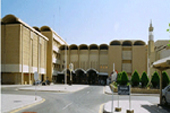Related Research Articles

Pharmacists, also known as chemists or druggists, are health professionals who specialize in the safe and effective use of medicines, as they deal with the composition, effects, mechanism of action and proper use of drugs. Using knowledge of the mechanism of action of drugs, the pharmacist understands how they should be used to achieve maximum benefit, minimal side effects and to avoid drug interactions. Pharmacists undergo university or graduate-level education to understand the biochemical mechanisms and actions of drugs, drug uses, therapeutic roles, side effects, potential drug interactions, and monitoring parameters. This is mated to anatomy, physiology, and pathophysiology. Pharmacists interpret and communicate this specialized knowledge to patients, physicians, and other health care providers.

The UCL School of Pharmacy is the pharmacy school of University College London (UCL). The School forms part of UCL's Faculty of Life Sciences and is located in London, United Kingdom.
A Doctor of Pharmacy is a professional doctorate in pharmacy. In some countries, it is a first professional degree and a prerequisite for licensing to practice the profession of pharmacy or to become a clinical pharmacist. In many countries they are allowed to practice independently and can prescribe drugs directly to patients. A PharmD program has significant experiential or clinical education components in introductory and advanced levels for the safe and effective use of drugs. Experiential education prepares graduates to be practice-ready, as they already have spent a significant amount of time training in areas of direct patient care and research. A PharmD graduate is entitled to prefix their name with "Dr."

The University of Macau is the only public research university in Macau. The UM campus is located in the east of Hengqin Island, Guangdong province in Mainland China, on a piece of land leased to the Macau SAR government, but is under the jurisdiction of Macau.

Erasmus University Rotterdam is a public university located in Rotterdam, Netherlands. The university is named after Desiderius Erasmus Roterodamus, a 15th-century humanist and theologian.

UniversitasAirlangga is the second-oldest university in Indonesia and also a public university located in Surabaya, East Java. Despite being officially established by Indonesian Government Regulation in 1954, Universitas Airlangga was first founded in 1948 as a distant branch of the University of Indonesia, with roots dating back to 1913. It started with a medical school and school of dentistry. Now Universitas Airlangga hosts 15 faculties with more than 35,000 students and 1,570 faculty members. Universitas Airlangga has university hospitals for the faculties of Medicine, Veterinary Medicine, Nursing, and Dentistry, as well as a tropical infection hospital for its Institute of Tropical Disease. The university is also equipped with biosafety level three facilities.
The Master of Sciences of Pharmacy (MPharm) is the standard master's degree program in Pharmacy. It is the oldest honourable Diploma (Degree) authorized from the European Faculties of Pharmacy as it takes five years to complete. It is based on a credit system higher than the normal Bachelor of Pharmacy degree. It is different from the American Pharmaceutical Diploma, Doctor of Pharmacy,(PharmD), that takes 4 years to complete. The Faculty is a member of the Association of European Faculties of Pharmacy and its graduates meet all the requirements for the profession as defined by the European Union. In the initial three years students revise and broaden their knowledge of elementary natural and medical subjects to the level required for understanding specific subjects from the field of Pharmacy. Students attend lectures and seminars and take part in practical pharmacy placements. During the last year of study they work on their thesis. The programme is concluded by defending the thesis and taking the final state examination. Then the students are awarded the master's degree. The study programme is compliant with EU directive 2005/36/EC. Graduates awarded the master's degree can later sit for a thorough state exam including an advanced thesis defence. After passing they are awarded the "Testing Board" degree . Graduates can apply for postgraduate after studying several branches of Pharmacy in the five accredited years. After defending their dissertation, submit their researches in their selected branches of Pharmacy and passing the final state examination they are awarded the degree. The master's program is offered in different specialized areas, one major being Clinical Pharmacy. Clinical pharmacy specialization enables pharmacists to deliver higher levels of clinical services. In some countries these specializations are happening with residency programs.
A Bachelor of Pharmacy is an undergraduate academic degree in the field of pharmacy. In many countries, this degree is a prerequisite for registration to practice as a pharmacist. Since both PharmB and PharmD are prerequisites to license in most western countries they’re considered equivalent. In many western countries, the foreign graduates with BPharm, PharmB or BS Pharm practice similarly as PharmD graduates. It is analogous to MBBS vs. MD where MBBS is foreign equivalent of MD. It is training to understand the properties and impacts of medicines and developing the skills required to counsel patients about their use.
The basic requirement for pharmacists to be considered for registration is an undergraduate or postgraduate pharmacy degree from a recognized university. In many countries, this involves a four- or five-year course to attain a master of pharmacy degree (MPharm). In the United States of America, students graduating after January 1, 2003, must complete a doctor of pharmacy degree to become a licensed pharmacist. This same requirement has been coming into place in other countries such as Canada and France.
University of Otago Faculty of Dentistry is one of the faculties of the University of Otago.
The University of Nottingham School of Pharmacy was founded in 1925 and is located in the University Park Campus of the university. The school also offers courses at the University's Malaysia campus in Kuala Lumpur with students spending two years in Malaysia and two years in Nottingham The School also offers the first joint Pharmacy course with China, with the Tianjin University of Traditional Chinese Medicine. The current head of The School is Professor Clive Roberts (2013-).

Faculty of Pharmaceutical Sciences, Chulalongkorn University is the first Pharmacy school in Thailand, located in Bangkok. The faculty was founded by Prince Rangsit Prayurasakdi on December 8, 1913 as a department of Doctor for Compounding in the Royal Medical College, commonly called "Rong Rean Prung Ya" which means "School of Compounding Medicine". After the establishment of Chulalongkorn University in 1916, the Royal Medical College became the Faculty of Medicine under the university. The department of Compounding Medicine also had been renamed to "Panak Phat Pasom Ya" or "Doctor for Compounding Medicine Department" since April 6, 1917. It is the first time that Pharmacy Education in Thailand has been elevated in higher educational system.
Kampala International University School of Health Sciences (KIUSHS), is the school of health sciences of Kampala International University, a private Ugandan university. The school provides health sciences education at the diploma, undergraduate and postgraduate levels.

Faculty of Medicine of The Chinese University of Hong Kong (CUHK) was established in 1981 and consists of five schools which offer an array of undergraduate and postgraduate programmes in the field of medicine, nursing, pharmacy and public health. The Hong Kong's Prince of Wales Hospital is the faculty's teaching facility and base of research. The medium of instruction of all programs is English while Chinese is also retained for the teaching of Chinese Medicine.

The University of Florida's (UF) online clinical toxicology distance education programs cater to working professionals, including physicians, nurses, physician assistants, first responders, and poison control center professionals. The programs focus on toxicants, drugs of abuse, drug analysis, and biotransformation, as well as the treatment of poisoned or overdosed patients. Classes are taught by internationally recognized faculty with expertise in clinical toxicology, medicine, pharmacy, and pharmacology.

The College of Medicine in King Saud University was established as the first medical college in the Kingdom in 1967. One year later, King Abdul-Aziz University Hospital, became affiliated with the college and subsequently in 1981, King Khalid University Hospital and the new college building were established to become the main teaching campus and patient service facility. To date, the college has graduated more than 4000 undergraduate students, 200 postgraduates students, and more than 700 graduates from different medical specialties fellowship programs.

The Busitema University Faculty of Health Sciences (BUFHS), also known as the Busitema University Medical School (BUMS) and the Busitema University School of Medicine (BUSM), is the school of medicine of Busitema University, one of Uganda's public universities. The medical school is one of the newer medical schools in the country, having been part of university since 2013. The school provides medical education at undergraduate and postgraduate levels.

Management & Science University is a private university in Malaysia located in Shah Alam, Selangor. The university was founded in 2001 as University College of Technology & Management Malaysia before officially became a full fledge university in October 2007 as Management & Science University.

University of Cyberjaya (UoC) is a registered and accredited private university with a focus on healthcare programmes. The university has been operating since its establishment in 2005 and offers over 20 diploma, degree and postgraduate programmes in the fields of medicine, pharmacy, psychology, occupational safety & health, homeopathy, physiotherapy, biomedical engineering technology, paramedical sciences and postgraduate courses such as the Masters in Clinical Pharmacy, Doctory of Pharmacy, MSc and PhD in Medical Sciences and Allied Health sciences. UoC was awarded a Tier 5 - Excellent rating by the Malaysian Qualifications Agency. It is in Cyberjaya, in Sepang District, Selangor, Malaysia.

USC School of Pharmacy is the pharmacy school of the University of Southern California, originally established in 1905 as USC College of Pharmacy. In 1918, it created the four-year bachelor of science in pharmacy degree program. In 1950, it established the nation's first Doctor of Pharmacy (PharmD) program. The School offers numerous dual- and joint-degree programs in such fields as law, business, public health, regulatory science, healthcare decision analysis, and gerontology. The School launched the nation's first PharmD/MBA dual degree in 1990, the first PhD in pharmaceutical economics and policy in 1994, the first professional doctorate in regulatory science in 2008, and a translational science graduate program that merges science with clinical expertise. The School is led by Dean Vassilios Papadopoulos.
References
- ↑ "Structure of the Division of Health Sciences, University of Otago". Division of Health Sciences, University of Otago. Retrieved 16 August 2016.
- ↑ "QS World University Rankings by Subject 2015 - Pharmacy & Pharmacology". QS Top Universities. Retrieved 16 August 2016.
- ↑ "Undergraduate study at the School of Pharmacy". School of Pharmacy, University of Otago. Retrieved 16 August 2016.
- ↑ "International students at the School of Pharmacy". School of Pharmacy, University of Otago. Retrieved 16 August 2016.
- ↑ "Postgraduate study at the School of Pharmacy". School of Pharmacy, University of Otago. Retrieved 16 August 2016.